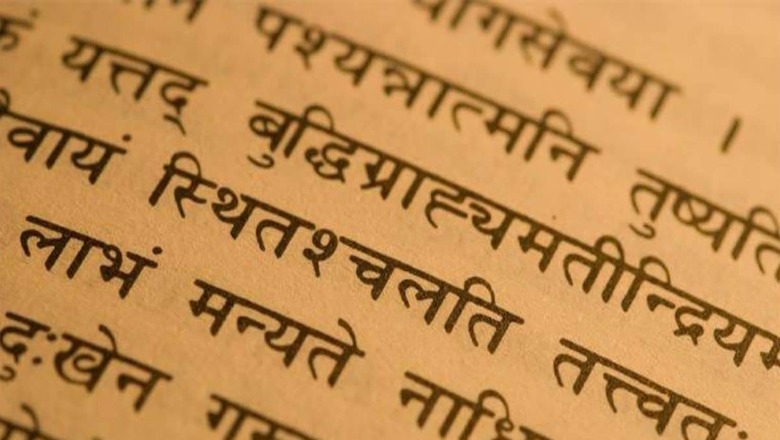
views
In the previous installment of this series, we saw how a new precedent and rule was concocted at Presidency College, Madras, as a result of vicious and sustained Dravidian propaganda aimed at destroying Sanskrit. The consequence was that henceforth, Sanskrit examiners were to be appointed solely on the basis of their caste. Accordingly, a five-member body of Sanskrit examiners was formed: three Brahmins, two non-Brahmins and one from a “really” backward caste.
The first three were easy to find. For the second category, an employee of the Indian Railways was discovered after a prolonged search. He had an M.A. in Sanskrit. But finding the other member proved a more uphill task. Several months of searching yielded no such candidate. This is when the University made an amendment: only a B.A. in Sanskrit would suffice for the post.
Finally, it netted a candidate who frankly confessed his inability: “Sir, forget Sanskrit, the last time I even touched a book was twenty-five years ago. I barely crawled through Sanskrit after flunking three times. I’ve forgotten how to write or read the Sanskrit alphabet. Now I’m doing well in my timber business. Please let me go.” But the Dravidianists were steely. After much persuasion, the timber merchant finally consented.
Now we arrive at the last category: the lone Sanskrit examiner from a really backward caste. This search ultimately ended in failure. In all of Tamil Nadu, there was simply no candidate fitting this description.
More debates and discussions ensued among the University luminaries. Ultimately, it was agreed that the real role of this candidate was to act as a policeman, ensuring that the other four members do not develop casteist feelings in their evaluations. Perchance if they were suspected of such feelings, he would bring in the necessary corrective measures. And who better than a real policeman to do the policing? So the government found a policeman from the Police Department and made him the examiner. No knowledge of Sanskrit was needed for the job of evaluating Sanskritists.
The cop embraced his new job with the zeal of a new convert. Instead of the time-honoured practice of evaluating answer sheets, he proposed a revolutionary idea: examiners had to know the caste of students in advance and award marks according to the backwardness or otherwise of the students. The other four members were horrified and vetoed his revolutionary idea. The same fate befell his other revolutionary ideas, the details of which are beyond the scope of this essay series.
But the cop was made of a much tougher material. After weeks of dogged lobbying with Dravidianist politicians, he managed to exert political pressure on the principal of Presidency College to somehow convince a bunch of unwilling backward caste students to enroll in the Sanskrit M.A. course. These students had never learnt Sanskrit since the day they were born.
The Sanskrit pandit of the department was a traditional Vaidika, deeply learned in tarka (logic) and vyakarana (grammar). He asked the policeman, “Are your students familiar with the Devanagari alphabet?” The cop was dumbfounded. He hadn’t even heard of something called Devanagari. But he had heard of the nagaari (trumpet) typically played in temples on occasions of festivals and processions. So, he said, “Of course, they play the nagaari with great skill!”
The Sanskrit pandit pitied his own plight but was forced to accept these students. Now the cop issued another command: these students had to be given special coaching. The pandit agreed again. But he put a very elementary test to them: pronunciation of the Sanskrit language. The students failed spectacularly. But the cop had his own brand of logic regarding phonetics: “What do you mean pronunciation? Any word can be pronounced in any manner in any language. Everybody knows this simple fact!” The poor Sanskrit pandit forced himself to reconcile with his destiny.
The outcome of the cop’s radical scheme was immediate and fatal. Within the space of a few classes, the unlikely Sanskrit students realised that they couldn’t grasp anything at all. But they were well-versed in human nature which responds to incentives. Confident that they had the backing of the powerful policeman, they used the caste card and complained against the pandit: “This vadyar (teacher) is deliberately not teaching us properly. We need a different vadyar.” But the principal put his foot down.
However, the issue by now acquired a life of its own, and finally reached its logical home: at the doorsteps of the Dravidianist politicians and ideologues. Uproarious debates erupted in the Legislative Assembly, University Senate, and in the halls of “pure” Tamil organisations and Veera (Warrior) Tamizh Associations.
As before, Dravidian tabloids had a phenomenal time denouncing “the Aryan invaders from the north,” the vile Brahmins, and Sanskrit supremacists. After much furore, the following decision was ultimately reached: the Sanskrit Department must be upgraded. The following was the reasoning they offered for this new proposal: “Why should only one community teach Sanskrit? Is there a rule that other communities are prohibited from teaching Sanskrit?”
Among other things, the upgrade involved creating reservations for the following posts: the Sanskrit Department would now have a chief lecturer, three assistant lecturers and two pandits. Qualifications for the posts were also amended: it was no longer necessary to have a Sanskrit degree (graduate or postgraduate); even “hobbyists” of Sanskrit could apply.
This was regarded as a major milestone in the Dravidianist version of The Great Leap Forward, of ensuring social justice by shattering the bourgeoise rules of intentionally making it difficult to learn a language. According to this reasoning, through this upgrade, Sanskrit would now be within the reach of everyone. By taking this revolutionary step, the Dravidianists claimed that they were actually making Sanskrit more accessible to a greater number of people.
This has an eerie parallel in our own time. Singer-activist T.M. Krishna, infamous for vitiating and damaging the realm of Carnatic classical music, appears to have taken a leaf precisely out of this revolutionary Dravidian step when he took Carnatic classical music literally to the gutters of Chennai. He claimed that this was his way of “liberating” classical music from “Brahmin oppression,” whatever that means.
The proverbial fruit, after all, does not fall far from the tree.
To Be Concluded
The author is the founder and chief editor, The Dharma Dispatch. Views expressed in the above piece are personal and solely that of the author. They do not necessarily reflect News18’s views.




















Comments
0 comment